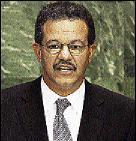
Fernández
We are not suggesting that Shell has been a bad partner - President Fernández
The Dominican Republic is seeking to acquire full control of an oil refinery jointly owned with Royal Dutch Shell PLC in a bid to stabilise domestic fuel prices.
President Leonel Fernández said Thursday that the Treasury minister has been authorised to begin negotiations for the company's 50 per cent stake in the Refidomsa refinery, which produces 30,000 barrels of fuel per day, just under a fifth of the Caribbean country's daily consumption.
In a broadcast speech largely devoted to a new energy conservation programme, Fernández said the joint-ownership arrangement has prevented the Dominican Republic from expanding the refinery - which would let it import its full fuel quota under PetroCaribe, a Venezuelan programme that provides oil to Caribbean nations under preferential terms.
"We are not suggesting that Shell has been a bad partner," the president said.
Strategic review
Shell said earlier this year, it was conducting a strategic review of its stake in Refidomsa, an indication that it was willing to sell. Company officials did not immediately respond Friday to a request for comment.
Business associations and Fernández's political foes criticised the potential buyout, saying the government should not assume responsibilities that belonged to the private sector.
"As a country, we have ill-fated experiences with the State taking control of things," said Joel Santos, president of the National Association of Young Businessmen.
The leader of the Opposition Social Christian Reforming Party said the government should be encouraging competition instead.
Refidomsa, on the outskirts of the Dominican capital, has been in operation since 1973. The government and Shell each hold four seats on the board of directors, though the company runs operations.
The Dominican Republic can import up to 50,000 barrels per day under PetroCaribe, which allows participating countries to finance a portion of their costs long term at low interest rates. But the country has been able to bring in only about 35,000 barrels a day, the government says.
Gas prices approaching US$5 per gallon have sparked protests in the Caribbean country, which imports all its fuel.
Fernández also said the government would try to increase fuel conservation by reducing traffic congestion in the capital and converting buses and taxis to run on natural gas.
- AP

